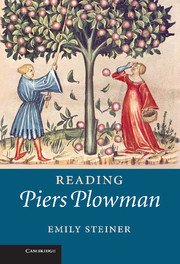7 - Institutions
(B.19–20)
Published online by Cambridge University Press: 05 May 2013
Summary
“Cometh with me, ye fooles, / Into Unite Holy Chirche”
(20.74–75)Introduction
The last two passūs of Piers Plowman return the poem to irresolution and experiment. At the end of B.18, with church bells tolling and the Four Daughters caroling, the poem seems to have reached its apogee and discovered its lost plot. The triumphant art of B.18, its dramatization of the Redemption, required a partial surrender to biblical narrative or the long history of belief, beginning with the Edenic Tree of Charity and ending with the risen Christ. More of Christian history remains to be written, however, namely, the founding of the church, the Apocalypse, and the Last Judgement. By treating the first two events but not the third B.19–20 moves the poem away from narrative resolution and throws its dreamer back onto a landscape of spiritual uncertainty and social critique. In the heady last lines of B.20, when Unity-Holy Church has been breached and Contrition lies comatose inside, Conscience abandons the community and vows to keep searching for Piers:
“By Crist!” quod Conscience tho, “I wole bicome a pilgrym,
And walken as wide as the world lasteth,
To seken Piers the Plowman, that Pryde myghte destruye,
And that freres hadde a fyndyng, that for nede flateren
And countrepledeth me, Conscience. Now Kynde me avenge,
And sende me hap and heele, til I have Piers the Plowman!”
And siththe he gradde after Grace, til I gan awake.
(20.381–87)
[“By Christ!” said Conscience then, “I will become a pilgrim,
And walk to the ends of the earth
To seek Piers the Plowman, who might destroy Pride,
And arrange a stipend for friars, who flatter for need
And who dispute with me, Conscience. Now may Kind avenge me,
And send me luck and health, until I have Piers the Plowman!”
And then he cried after Grace, until I woke up.]
- Type
- Chapter
- Information
- Reading Piers Plowman , pp. 211 - 228Publisher: Cambridge University PressPrint publication year: 2013

